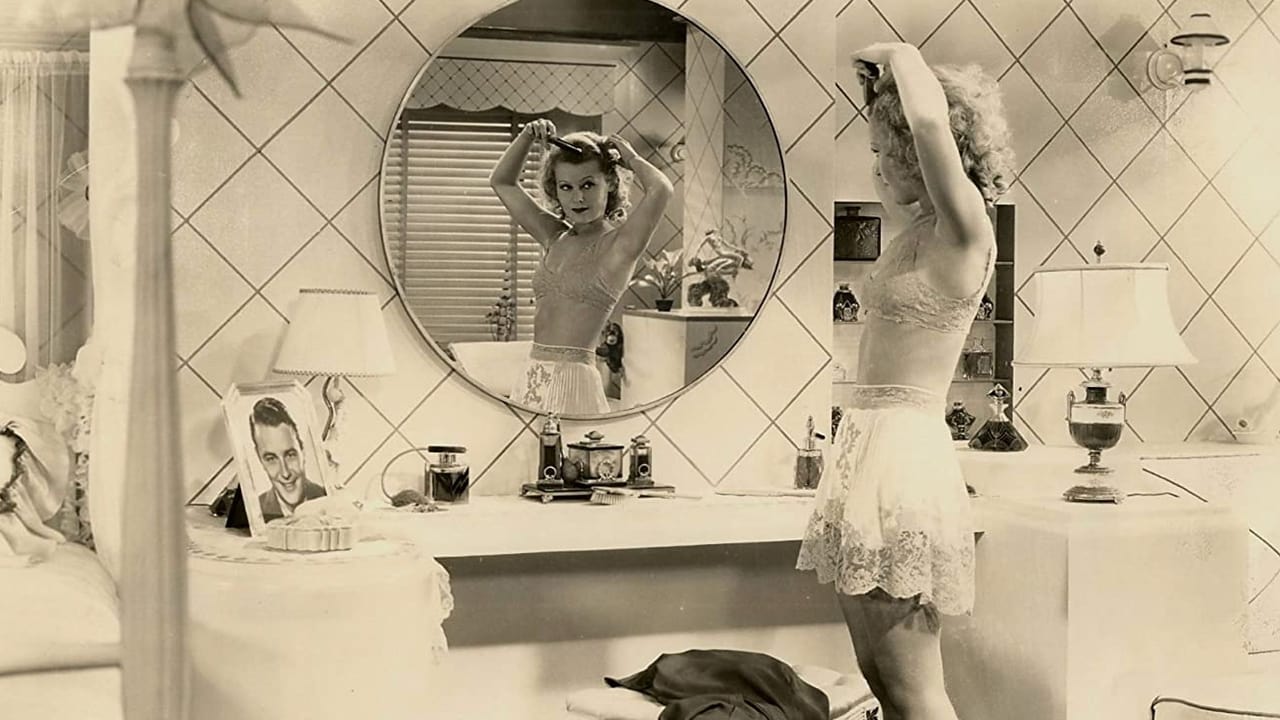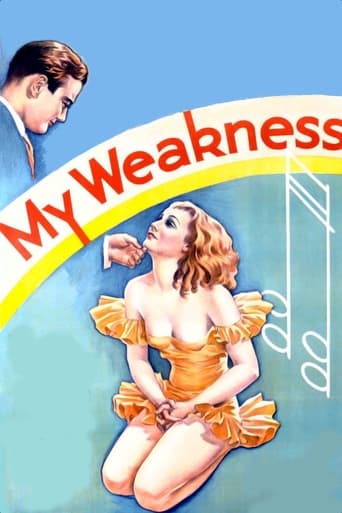



n my opinion it was a great movie with some interesting elements, even though having some plot holes and the ending probably was just too messy and crammed together, but still fun to watch and not your casual movie that is similar to all other ones.
View MoreThe performances transcend the film's tropes, grounding it in characters that feel more complete than this subgenre often produces.
View MoreI think this is a new genre that they're all sort of working their way through it and haven't got all the kinks worked out yet but it's a genre that works for me.
View MoreThe film's masterful storytelling did its job. The message was clear. No need to overdo.
View MoreI caught a 35mm screening of MY WEAKNESS at the 12th annual Capitolfest in Rome, NY and absolutely adored it. It's a twist on Pygmalion in which an uncouth office cleaning woman (Lilian Harvey) with hidden intentions, agrees to a make-over, leading her to deceive three different men into wanting to marry her... Charles Butterworth, Henry Travers and Lew Ayers. The dialogue is often reminiscent of what one might expect from the mouth of Groucho Marx, and it is laden with innuendo (when chastised for not taking an interest in his uncle's brassier manufacturing business, the playboy nephew indicates he does his best to stay in touch with their product," and in another scene, a saleswoman announces that "brassieres will be half-off on Tuesday".) Best of all is a song titled YOU CAN BE HAD - BE CAREFUL sung by animated nick-knacks, toys, human wine-stopper cork figurines and Rodin's "The Thinker", one figurine ridiculously having the voice of Popeye. Additionally, movie star magazine portraits join the chorus, adding the (imitated?) voices of - among others - Janet Gaynor, Clara Bow and Will Rogers (whose daughter, Mary, also has a role in the film). Also featured in the film - as Cupid - is Harry Langdon.
View MoreOur story begins somewhere over the rainbow, in that distant fairyland of angelic music and fleecy clouds which in old Hollywood movies is usually meant to represent "Heaven." But this isn't the afterlife, it's the ethereal dwelling of Dan Cupid, the mythical imp who shoots humans with arrows and causes them to fall in love. Cupid is played by silent comedy veteran Harry Langdon, who sports wings, a white wig, and a Regency period tailcoat and breeches. In painting and sculpture Cupid is usually depicted as a nude winged boy, while in the more recent (and puritanical) American tradition he wears diapers; I must confess that Harry's quaint 19th century outfit came as something of a relief. In any event, this Cupid addresses the audience directly, introduces himself and demonstrates his power by firing a couple of arrows earthward, instantly transforming an indifferent young man and woman into lovers. He admits however that it isn't always so easy, and proceeds to relate the tale of the toughest case he ever had; thereafter, the story is told in flashback, with occasional interjections by the narrator.We meet a handsome and wealthy young man named Ronnie Gregory (played by Lew Ayres) who is dismayed to learn that his allowance has been cut off by his Uncle Ellery (Henry Travers). Ellery runs the family business, a brassiere company, and is unhappy about Ronnie's spendthrift ways and prolific womanizing. He is also unhappy that his nephew has refused to go into the business of manufacturing bras, though Ronnie just grins and remarks that he is nonetheless keeping in touch with the company's product. (And he looks like he means it, too.) The two men argue about Ronnie's love life, and somehow the discussion turns to whether he could take a homely woman, transform her into a glamour girl, and marry her off to Uncle Ellery's bachelor son, an ascetic, unappealing and apparently asexual oddball named Gerald (Charles Butterworth). At this point, their squabble is interrupted by the awkward arrival of the building's cleaning lady, a Cockney flower girl named Eliza Doolittle. No, actually she's named Looloo Blake, and she's played by our leading lady Lillian Harvey, but from here on we're in Pygmalion territory. Ronnie bets his uncle that he can transform this ungainly wench into a smooth fashion plate, and make Gerald fall for her and marry her. The bet is on, and so is the movie, but despite the Art Deco trappings and sassy Pre-Code wisecracks if you've read your Shaw you know exactly what's coming, plot-wise.Ronnie's harem of glamorous girlfriends collectively take up the challenge, and each one volunteers to give Looloo lessons in modern dating behavior. (The gorgeous brunette named Jacqueline who agrees to teach Looloo manners is played by Susan Fleming, who would later marry Harpo Marx, and her line readings here are just as amusingly flat as in Million Dollar Legs.) Looloo, for her part, emerges as a feisty and rather eccentric English girl who can't figure out why all this fuss is being made over her. She finds her intended husband Gerald quite off-putting, what with his stamp collection and diet of raw carrots, but she quickly takes a shine to Ronnie, much to the dismay of her earthy would-be boyfriend Maxie. Things get even more complicated when randy old Uncle Ellery, who is slated to marry a woman who looks young enough to be his granddaughter, falls for Looloo himself. Plainly, Dan Cupid has made a mess of things.The plot isn't important, and, as noted above, anyone familiar with Pygmalion or its musical remake My Fair Lady has the inside track on how the story is going to be resolved. My Weakness was concocted to mark the American debut of Lillian Harvey, an Anglo-German musical comedy star who made a splash in silent films and early talkies in Germany, and came to Hollywood at this time in an attempt to duplicate her European success. According to one reference guide, her elfin persona suggested an amalgam of Mary Pickford and Margaret Sullavan, but while watching her here I found myself thinking that Miss Harvey's angular appearance and comic style are more suggestive of Carole Lombard and Lucille Ball. Unfortunately, her material never quite rises to the occasion. You can't fault the filmmakers for trying: My Weakness is full of quirky, stylish touches and off-the-wall ideas. It's funny at times, but several of the quips fall flat, some of the ideas are more weird than clever, and the story momentum doesn't build the way we would like. The film meanders when it should race.Melodically speaking the songs aren't as memorable as we might like, either, but one musical number is, hands down, the movie's most unforgettable scene. Early on, after Looloo has been installed in a fabulous Deco apartment and realizes that she's falling for Ronnie, the knickknacks in her living-room come to life and sing her a song of warning about the perils of romance: "You Can Be Had -- Be Careful!" Cupid joins in too, fluttering about the place and revealing himself to be the size of a pigeon. Even the stars in Looloo's movie magazine take part: as the pages flip past and pause on photos of Will Rogers, Clara Bow, Janet Gaynor and Warner Baxter we hear their impersonated voices each taking a chorus of the song. It's a bizarre sequence that for me was the highlight of this strange, obscure curio. I gather Lillian Harvey's other American films were more successful than this one, artistically at least, but even when it doesn't quite come off My Weakness is affable and generally fun. Fans of Pre-Code oddities will certainly enjoy the fashions, the decor, and the risqué jokes. I wish the script had been better, though. There's something missing here, and it isn't just the Original Story credit for George Bernard Shaw.
View More